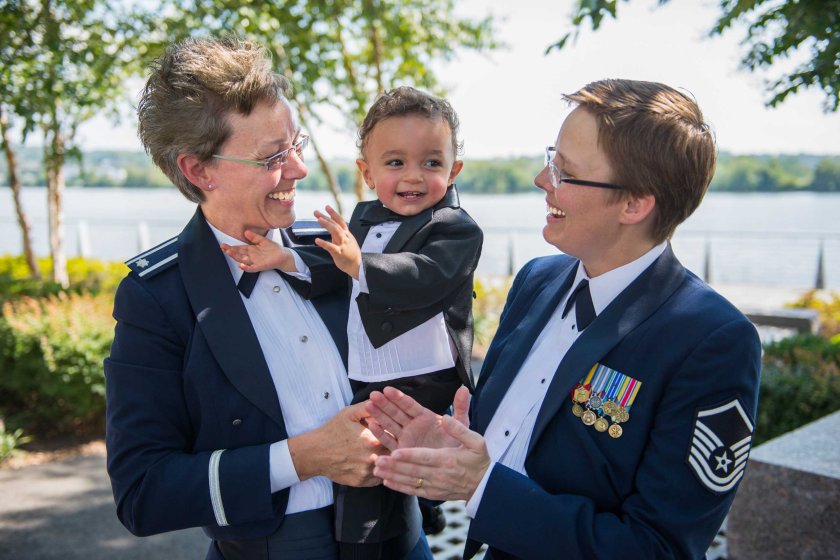
Chris Rowzee, 51, is a retired Air Force lieutenant colonel and a spokesperson for the American Military Partner Association.
I met my wife, Novia, in 2001, just a month before 9/11, through mutual friends, which was the only safe way to meet other gay people before the demise of Don’t Ask Don’t Tell and DOMA. Her best friend and my ex-girlfriend were dating, and she introduced us.
In 2004, we were living for all intents and purposes as a married couple—but very closeted—in a military town in Little Rock, Arkansas. We were in the same Air Wing, and we were basically afraid to go anywhere together. We had to be very careful, for example, if we went out to eat or to a movie or even something as simple as shopping at the commissary or the BX. We’d take separate cars and shop separately and just talk on the phone about who was buying what. Occasionally, someone from our unit would come up and say, “Hey I saw you and so-and-so eating dinner at such and such.” And I would think, “oh crap, somebody saw us.” It felt like we were living in a fishbowl and it was very stressful.
[time-brightcove not-tgx=”true”]
Then I deployed to Kuwait in December 2004, and my appendix ruptured. Usually, if military members get sick or injured while they’re deployed, their family gets an official notification. But I couldn’t list Novia as my next of kin without risking outing us and both of us being kicked out of the military. So she found out almost a full 48 hours after I got sick and had emergency surgery—and only then because part of her job in our unit was to receive casualty messages.
That was a life-altering experience for me, because Novia and I had been talking about starting a family. But how could we do that living the closeted life we were living? Only one of us would be able to be the legal parent of the child. If he got sick, only one of us would be able to go to school and pick him up. As he grew up, he would only be able to call one of us mommy. We’d always have to worry about whether he would say something at school that might out us as a gay couple and get us kicked out of the military. And worse yet, what kind of message would it send to our child hiding who we were and our life together?
So we left full time military duty and moved to Louisville, joining National Guard units in different states. She joined the Kentucky Air National Guard, and I joined the Ohio Air National Guard. That worked out very well because our units were nowhere near each other, so we were able to ride out the rest of Don’t Ask, Don’t Tell without worrying about running into unit members. We didn’t realize until we moved how heavy the weight was that was taken off our shoulders. We started the adoption process, and three years later, we were blessed with our son Christopher. He’s now 2.
Shortly after DADT was repealed, I walked into my wing commander’s office and told him I was gay, and I was available to help with the repeal transition if he needed it. In the year I had left before retirement, I wanted to serve openly and be a role model for younger LGBT troops who might have fears of coming out while serving. And as it turned out, one of my subordinates—who I never would have guessed was gay—came out to me a short while later, telling me that my coming out had emboldened her to be more open with her own life.
Now that DOMA has been repealed, Novia and I are legally married, as well, and her unit has fully embraced her, and me as her spouse.
—as told to Olivia B. Waxman